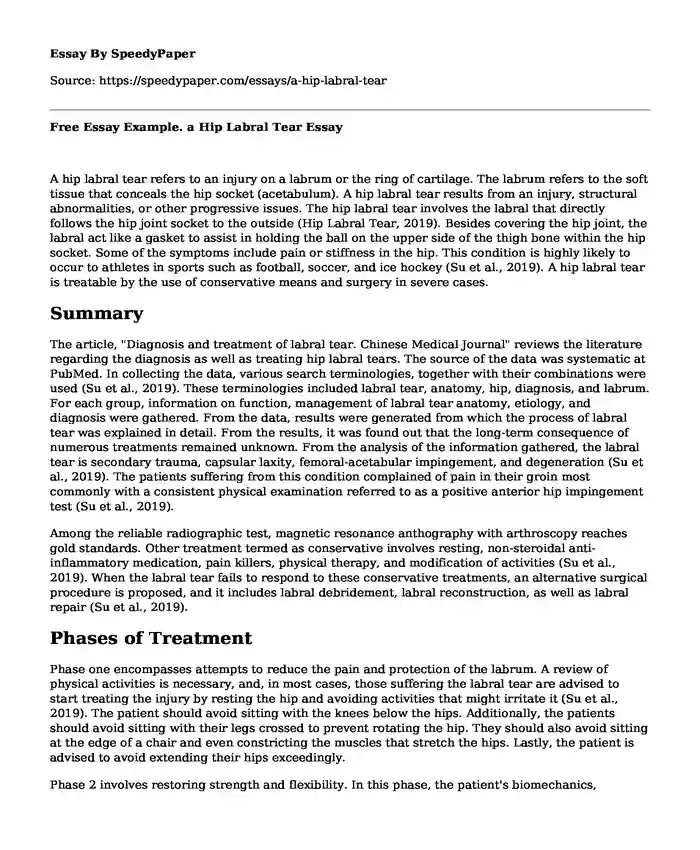
| Type of paper: | Research paper |
| Categories: | Surgery Anatomy Healthcare |
| Pages: | 3 |
| Wordcount: | 779 words |
A hip labral tear refers to an injury on a labrum or the ring of cartilage. The labrum refers to the soft tissue that conceals the hip socket (acetabulum). A hip labral tear results from an injury, structural abnormalities, or other progressive issues. The hip labral tear involves the labral that directly follows the hip joint socket to the outside (Hip Labral Tear, 2019). Besides covering the hip joint, the labral act like a gasket to assist in holding the ball on the upper side of the thigh bone within the hip socket. Some of the symptoms include pain or stiffness in the hip. This condition is highly likely to occur to athletes in sports such as football, soccer, and ice hockey (Su et al., 2019). A hip labral tear is treatable by the use of conservative means and surgery in severe cases.
Summary
The article, "Diagnosis and treatment of labral tear. Chinese Medical Journal" reviews the literature regarding the diagnosis as well as treating hip labral tears. The source of the data was systematic at PubMed. In collecting the data, various search terminologies, together with their combinations were used (Su et al., 2019). These terminologies included labral tear, anatomy, hip, diagnosis, and labrum. For each group, information on function, management of labral tear anatomy, etiology, and diagnosis were gathered. From the data, results were generated from which the process of labral tear was explained in detail. From the results, it was found out that the long-term consequence of numerous treatments remained unknown. From the analysis of the information gathered, the labral tear is secondary trauma, capsular laxity, femoral-acetabular impingement, and degeneration (Su et al., 2019). The patients suffering from this condition complained of pain in their groin most commonly with a consistent physical examination referred to as a positive anterior hip impingement test (Su et al., 2019).
Among the reliable radiographic test, magnetic resonance anthography with arthroscopy reaches gold standards. Other treatment termed as conservative involves resting, non-steroidal anti-inflammatory medication, pain killers, physical therapy, and modification of activities (Su et al., 2019). When the labral tear fails to respond to these conservative treatments, an alternative surgical procedure is proposed, and it includes labral debridement, labral reconstruction, as well as labral repair (Su et al., 2019).
Phases of Treatment
Phase one encompasses attempts to reduce the pain and protection of the labrum. A review of physical activities is necessary, and, in most cases, those suffering the labral tear are advised to start treating the injury by resting the hip and avoiding activities that might irritate it (Su et al., 2019). The patient should avoid sitting with the knees below the hips. Additionally, the patients should avoid sitting with their legs crossed to prevent rotating the hip. They should also avoid sitting at the edge of a chair and even constricting the muscles that stretch the hips. Lastly, the patient is advised to avoid extending their hips exceedingly.
Phase 2 involves restoring strength and flexibility. In this phase, the patient's biomechanics, muscles, and joints functions are assessed by the physiotherapists. Any limited joint range of motion is restored, and improvements are made on the soft-tissue muscle length and the resting tension (Su et al., 2019). The patient activates their deep stability muscles as they progressively strengthen their superficial and intermediate muscles. This is followed by enhancing proprioception and joint position sense.
If the patient has improved on the above phases, they can return to their normal activities or sport. This is phase 3 of treatment. The aim of this is to improve the functional activities of normal daily living (ADLs) via goal-oriented exercises. The patient graduates by returning to normal operations or the sport that is specific to their needs (Hip Labral Tear, 2019). These may include speed, power, agility, and the drill associated with the particular sport. However, in engaging in these aggressive activities, the patient should actively involve the doctor of the physiotherapist, who might recommend pain medicines or injections, which act as temporal pain relievers (Hip Labral Tear, 2019).
However, some labral tears can not be treated using these conservative means. A surgical procedure on the hip is recommended. The surgery is required to stop the pain and clicking. The process aims at improving the integrity of the hip joint and should reduce future degeneration related to labral tears. This surgery involves reattaching the labrum and often debriding the labrum (Hip Labral Tear, 2019). Patients require post-operative rehabilitation with the guidance of the physiotherapist and the surgeon to facilitate the safe return to regular physical activities.
References
Su, T., Chen, G.-X., & Yang, L. (2019). Diagnosis and treatment of labral tear. Chinese Medical Journal, 132(2), 211-219. https://doi.org/10.1097/cm9.0000000000000020
Hip Labral Tear. (2019). Physioworks.Com.Au. https://physioworks.com.au/injuries-conditions-1/hip-labral-tear
Cite this page
Free Essay Example. a Hip Labral Tear. (2023, Apr 05). Retrieved from https://speedypaper.net/essays/a-hip-labral-tear
Request Removal
If you are the original author of this essay and no longer wish to have it published on the SpeedyPaper website, please click below to request its removal:
- The most difficult academic problem you have overcome
- Free Essay on Intervention Study
- Chain of 20 Restaurants - Social Media Marketing Free Essay
- Leadership Essay Example: Knowing Your Authentic Self
- Miller vs. Alabama, Law Essay Example
- Essay Sample on Classification of Divorce
- Paper Sample on National Healthcare Issue
Popular categories




